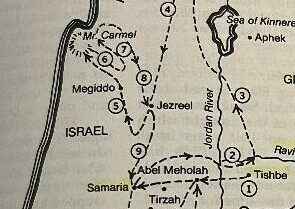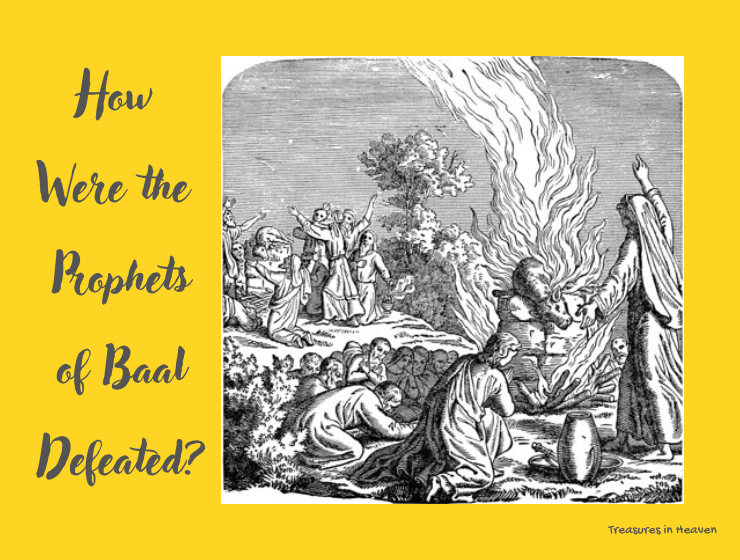…Then they called on the name of Baal from morning until noontime,
shouting, “O Baal, answer us!” But there was no reply of any kind…
1 Kings 18:26
After Elijah told the king there wouldn’t be any more rain until he said the word, God sent him into hiding, first at the Brook Cherith and then in Zarephath.
Three and a half years later, God tells Elijah to present himself to King Ahab, and He will send the rain.
So, Elijah leaves Zarephath and heads back to Samaria. On the way, he meets Obadiah and sends him to tell the king, “Elijah is here.”
At first, Obadiah doesn’t want to go because he’s afraid Elijah will disappear and the king will kill him. However, Elijah swears by the Lord Almighty that he will see the king that day. So, finally, Obadiah goes.
When Ahab hears the news, he finds Elijah. After a short conversation about who Israel’s real troublemaker is, Elijah tells the king to summon all of Israel to join him at Mount Carmel, along with the 450 prophets of Baal and the 400 prophets of Asherah.
So, the king did as Elijah asked. And the showdown that was about to happen would end with the prophets of Baal being defeated. This story can be found in 1 Kings 18:19-40.
Table of Contents
Waver Between Two Opinions

King Ahab called all of Israel and the prophets of Baal and Asherah to Mount Carmel at Elijah’s request. Hundreds, if not thousands, of people congregated there.
Mount Carmel is a range of mountains, with the highest point at 1,742 feet in elevation. It extends thirty miles southeast of modern-day Haifa from the shores of the Mediterranean Sea.
Although we don’t know where this showdown took place on Mount Carmel, Muhraka is suggested as one probable site.
Elijah approached all the people and said, “How long will you waver between two opinions? If the Lord is God, follow Him. But if Baal, follow him” (1 Kings 18:21)
The CSB note says:
The phrase “two opinions” uses the Hebrew word ‘saif’, which means “crutches made from two sticks.” So, an alternate translation might be, “How long will you limp about on two crutches?” The point of this metaphor was not about wavering between two opinions but about the damage Israel was doing to itself by refusing to follow the Lord.
Furthermore, if one is the true God and the other isn’t, why wouldn’t you only follow the true God? Trying to follow both is foolish.
Regardless, the people couldn’t argue with what Elijah said, so they remained silent.
The Challenge is Given
Elijah said today they would find out who the true God was.
First, he (being the only prophet of God present) and the 450 prophets of Baal would each prepare a sacrifice to their god but not light it, and whichever god answered by fire would be the true God.
Baal was known as a fertility god. He supposedly sent rain to grow crops, providing food for the people. He was also thought to control lightning so he could strike the sacrifice, causing it to catch fire.
The lack of rain for three and a half years would have embarrassed the prophets of Baal. So, Elijah’s challenge seemed like an excellent opportunity for them to vindicate their god.
The False Prophets Fail
Elijah told the prophets of Baal to go first since they were larger in number. After the preparations were finished, they began calling on Baal’s name.
They shouted, “O Baal, answer us!” from morning until noon, dancing around the altar. But there was no reply. (1 Kings 18:26)
At noon, Elijah began taunting them, “Shout louder, for he’s a god! Maybe he’s thinking it over or is busy. Maybe he’s on a journey or sleeping and needs to be awakened.” (1 Kings 18:27)
Surprisingly, they shouted louder and even cut themselves with knives and spears (as was their custom) until blood gushed over them. They continued this way until it was time for the evening sacrifice (3 pm). (1 Kings 18:28-29)
Still, nothing! No sound, no one answered, no one paid attention. In other words, Baal did not answer with fire; his prophets had failed.
Of course, we know it’s because Baal is not a real god nor the true God. Elijah knew it, too.
Elijah’s Success
When it became apparent that the prophets of Baal had failed, Elijah called for the people to gather around him. He began by repairing the altar built long before but had been torn down.
He chose twelve stones, one for each of the twelve tribes. Even though the tribes were now divided into two kingdoms, they were still one in God’s eyes and for His purposes. With the twelve stones, Elijah built an altar in the name of the Lord.
Next, he dug a trench around the altar, large enough to hold two measures of seed or about three (NLT) to four (CSB) gallons.
Elijah then arranged the wood, cut up the bull, and placed it on the wood.
Finally, Elijah called for the entire sacrifice to be soaked with water. Three times, he said, “Fill four large jars with water and pour it on the offering and on the wood.” (1 Kings 18:33-35) There was so much water that it flowed around the altar and filled the trench, too.
The whole point of soaking the sacrifice was so the people would know what happened next was a miracle, not some trick or natural phenomenon.
When Elijah finished his preparations, it was time for the evening sacrifice (the same time the prophets of Baal stopped calling on their god).
Elijah approached the altar and began to pray: “Lord, the God of Abraham, Isaac, and Israel, today let it be known that you are God in Israel and I am your servant, and at your word I have done all these things. Answer me, Lord. Answer me so that this people will know that you, the Lord, are God and that you have turned their hearts back.” (1 Kings 18:36-37)
“Then the Lord‘s fire fell and consumed the offering, the wood, the stones, and the dust, and it licked up the water that was in the trench.” (1 Kings 18:38)
Success!
What Happened Next
When all the people saw that everything was consumed, they fell facedown on the ground and said, “The Lord, he is God! The Lord, he is God!” The people’s hearts were turned back to God (see Elijah’s prayer v. 37).
But what about the prophets of Baal?
Elijah ordered the people to seize them, and he led them to the Kishon Valley, where they were slaughtered. The Kishon Valley ran parallel to the Carmel mountain range on its north side.
This gruesome act was done in obedience to the Lord. God had previously given Moses the command to kill all false prophets (Deut 13:12-15). Also, remember what Elijah prayed: “Today let it be known that…at your word I have done all these things.”
Next, Elijah told King Ahab to get something to eat and drink because he could hear the sound of rain coming. Ahab went to eat and drink, and Elijah went to the top of Mount Carmel.
RELATED > > > > > Elijah Part 6 – How Does the Rain Come When Elijah Prays?
Final thoughts
God had trained Elijah for three and a half years to prepare him for this showdown. Elijah knew God would do what He said He would, and the prophets of Baal would be defeated.
Elijah did everything God told him to; therefore, he could be confident and bold when facing the prophets of Baal.
What can we, as believers, learn from a story like this one?
It’s doubtful we will have to confront false prophets in such dramatic fashion, but that’s not the point for us to learn.
Number one is obedience to and trust in God. He has given us everything we need for life and godliness (2 Pet 1:3).
God’s word contains many promises we can hold onto with the same confidence that Elijah had. God:
- Cannot lie (Num 23:19; Heb 6:18; Tit 1:2)
- Is faithful to do what He says He will do (Deut 7:9; 1 Cor 1:9; 1 Thess 5:24; 2 Thess 3:3)
- Will prepare us for whatever He has called us to do (Phil 2:13; 2 Tim 3:16-17; Heb 13:20-21).
What else might God want you to learn from this story?
Source: Walvoord, John F. The Bible Knowledge Commentary, Victor Books, 1986

Hi Lynn,
I always think of the bravery it took for Elijah to stand up to the false prophets in that meeting. He truly was all alone; or so it seemed. He had his God with him and that was enough. Elijah’s unwavering trust in God, his boldness in the face of overwhelming opposition, and the miraculous demonstration of God’s power remind us that true faith requires complete reliance on God’s promises. This story challenges us to examine our own faith and commitment, encouraging us to follow Elijah’s example by being steadfast in our obedience and trust in God. Just as God vindicated Elijah, He will support and equip us for the tasks He calls us to, reinforcing that He is the one true God worthy of our devotion.
Inspiring!
– Scott
Hi Scott,
Amen! Elijah was truly a unique prophet, and we can learn so much from his unwavering trust in the Lord. I believe God’s grace was on him, and he didn’t muster up his own courage. I am still learning these lessons every day.
Lynn